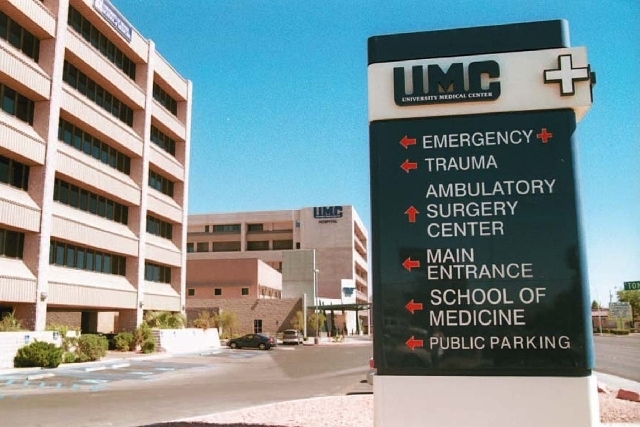UMC Foundation nonprofit loses tax status
UMC Foundation, the nonprofit organization that raises private donations for University Medical Center, has lost its tax-exempt status, the Review-Journal has learned.
The foundation failed to file annual returns with the Internal Revenue Service for three consecutive years, which resulted in the IRS revoking its tax-exempt status, according to the federal agency’s notice. The IRS publicly posted the notice in March.
Also, in 2012, a state auditor found problems with financial paperwork required for the foundation’s participation in a specialty license plate program.
The foundation’s situation has come in the absence of a full-time executive director for the organization. The hospital had staffed the position until October 2010, when the director resigned. A replacement wasn’t hired due to staff consolidations the hospital made.
A foundation official said having a full-time director on board would provide the attention needed to avoid such situations.
For now, the foundation cannot use its tax-exempt status to raise money for the public hospital in Las Vegas. It is not cashing any donations at this time because of the IRS notice, the organization’s board president, Harry Hagerty, said.
The foundation’s work historically has aided the cash-strapped hospital with unmet needs. In 2009, it gave the hospital $235,000 for equipment in the nursery’s intensive care unit, labor and delivery services and pediatrics-intensive care unit. That equipment included fetal monitors, transport monitors, incubators and cribs, records show.
The foundation also paid for a family retreat room that gives families of hospitalized children a place to rest, and generated money for the employee assistance program, which helps UMC employees in hardships.
In 2008 and 2009, the organization raised nearly $1 million, records show.
SOLUTION IN THE WORKS
Hagerty said the foundation intends to resolve the situation and will complete the necessary audits and file forms to restore its tax-exempt status with the IRS. The IRS requires that nonprofit organizations keep their tax-exempt status by filing public, annual returns that disclose financial information such as revenues, expenses and assets.
When a nonprofit organization doesn’t file for three consecutive years, the IRS automatically removes its tax-exempt status.
The problem should be fixed by the end of June, if not sooner, Hagerty said.
Hagerty said the situation began after the hospital, which previously had paid the salary of the foundation’s executive director, didn’t hire a replacement. In the past, the director was responsible for the paperwork, he said.
It’s possible that eventually the foundation and hospital will bring a director on board, Hagerty said, though he’s uncertain when that might happen.
Following an inquiry from the Review-Journal, the hospital acknowledged the foundation’s situation. The director position, unfilled since October 2010, had an annual salary of $62,545, according to the hospital.
“Unfortunately, when we had to eliminate positions a few years ago, the Foundation Director position was consolidated with another position and the tax-exempt forms were not filed as they should have been,” UMC spokeswoman Danita Cohen said in a statement. “We are working to have the appropriate forms filed in order for our tax-exempt status to be reinstated. Philanthropic community support is vital to our mission of serving all who need us. We greatly appreciate every donation that comes to UMC and we will remedy this as quickly as possible.”
In an email, Cohen said the hospital is evaluating whether to hire a foundation director.
“UMC is currently looking at the structure of the UMC Foundation to determine if UMC will hire a Foundation Director, or if that position will be hired directly from the Foundation, which is a separate entity from UMC,” she said in a statement.
Suzanne Hackett-Morgan left her job as the foundation’s executive director in October 2010.
“That’s sad news,” she said, when told about the IRS development. “I think that foundation’s really, really important.”
However, she said, the nonprofit can regain its tax-exempt status.
“That’s easily correctable,” she said. “It happens quite often in the nonprofit world.”
In general, the problem of not filing the forms can surface when a nonprofit organization goes through a transition, she said.
“It shouldn’t be a cause for alarm,” she said. “It’s a situation where they need to communicate with the IRS what the situation was.”
OTHER ISSUES
It’s not the foundation’s first time to have financial paperwork problems without a director at the helm.
In 2010, it obtained permission from the state’s Commission on Special License Plates to begin a specialized vehicle license plate program for motorists who want to show support for health care. Through the program, a portion of the proceeds would go to the hospital’s development of a multiorgan transplant service.
Through the speciality license plate program, $25 of the $61 fee for each license plate goes to the charity’s cause.
The license plate became available in late 2011, with the hospital and foundation announcing its launch in a January 2012 news release.
Eight months later, in September, the state’s Legislative Counsel Bureau found problems with the organization’s record-keeping in a routine review of charities participating in the program. Forms and records were late and inaccurate, according to the state report.
State records showed $7,943 from the license plate program went to the foundation in fiscal year 2012. But the charity, in turn, only reported revenues of $2,574 to the state from the program, a legislative auditor found.
Hagerty said that issue is another example of an error that could have been avoided with an executive director devoted to the foundation.
The program has generated $23,850 in fees that went to the foundation, according to a January state report.
LICENSE PLATES END
Ultimately, the license plate effort failed to gain traction.
The state has a threshold that new specialty license plates must reach: 1,000 registered plates. By the end of 2012, that minimum goal was not reached.
The specialty plate is now on just 683 vehicles in Nevada, according to state Department of Motor Vehicles records.
“It needed to have 1,000 people with the plate on Dec. 31 of 2012 for it to continue,” said Rick Combs, director of the Legislative Counsel Bureau. “No one new can get the plate.”
The only money the foundation will receive from the license plates in the future will come from registration renewals of existing plates.
Those results might have fallen short because the foundation no longer had a full-time director to promote the plate when it became available.
The foundation’s marketing plan submitted in its 2010 application indicated an intent to promote the plate among the hospital’s 4,000 employees and other medical professionals across Nevada, with foundation staff having a hand in the work.
The application didn’t give a goal for how many license plates would be bought. But at the time, officials were confident in the size of its target market: more than 44,745 health care professionals and medical students.
Hagerty said he’s not sure if the effort would have reached the 1,000-plate mark with a director in place.
But, he said, “I’m sure we would have sold more or gotten more people to sign up for it if we’d had a full-time foundation director.”
Contact reporter Ben Botkin at
bbotkin@reviewjournal.com or 702-405-9781.




























